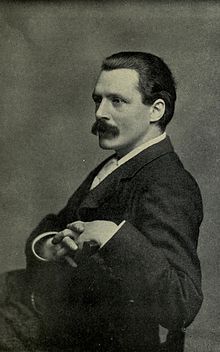George Gissing
Gissing's father died when he was 12 years old, and he and his brothers were sent to Lindow Grove School at Alderley Edge in Cheshire, where he was a solitary student who studied hard.
When he ran short of money and stole from his fellow students, Gissing's academic career ended in disgrace.
The college hired a detective to investigate the thefts, and Gissing was prosecuted, found guilty, expelled, and sentenced to a month's hard labour in Belle Vue Gaol, Manchester, in 1876.
[1] In September 1876, with support from sympathisers, he travelled to the United States, where he spent time in Boston and Waltham, Massachusetts, writing and teaching classics.
[nb 1][1] After returning to England, Gissing settled in London with Nell, writing fiction and working as a private tutor.
[13] According to his pupil Austin Harrison, from 1882 Gissing made a decent living by teaching; tales of a fight with poverty, including some of his own remembrances, were untrue.
[15][16] Gissing's next novel, Mrs Grundy's Enemies, remained unpublished like the first, although bought for publication by Bentley & Son in 1882.
[1] Between his return to England and publication of The Unclassed, Gissing wrote 11 short stories, but only "Phoebe" appeared at the time, in the March 1884 issue of Temple Bar.
Gissing used £150 earned from the rights to The Nether World in 1889 to fund a long-awaited trip to Italy to pursue his interest in the classics.
Edith did not understand his work and Gissing insisted on keeping them socially isolated from his peers, which exacerbated the problems.
She may have gone into violent, uncontrolled rages as Gissing claimed in letters to Bertz, but the truth is elusive at this distance in time.
The couple separated in 1897, though this was no clean break - Gissing spent time dodging Edith and afraid she might seek a reconciliation.
Wells said Gissing was "no longer the glorious, indefatigable, impracticable youth of the London flat, but a damaged and ailing man, full of ill-advised precautions against the imaginary illnesses that were his interpretations of a general malaise.
[1] In July 1898, Gissing met Gabrielle Marie Edith Fleury (1868–1954), a Frenchwoman who approached him for permission to translate New Grub Street.
They moved to France, where he remained, returning to England briefly in 1901 for a six-week stay in a sanatorium in Nayland, Suffolk.
He wrote several novels during his third marriage, including Among the Prophets, which remained unpublished and has not survived, Our Friend the Charlatan (1901) and Will Warburton (published posthumously in 1905).
In 1903, he published The Private Papers of Henry Ryecroft, written in 1900–1901 and appearing initially as a serial entitled "An author at grass" in the Fortnightly Review.
Wells characterized him as a "flimsy inordinate stir of grey matter", and wrote of Gissing's "poor vexed brain—so competent for learning and aesthetic reception, so incompetent, so impulsive and weakly yielding under the real stresses of life", adding: "He was a pessimistic writer.
After a brief youthful flirtation with socialism, Gissing lost faith in the labour movements and scorned the popular enthusiasms of his day.
[32] In 1892, he told his sister Ellen, "I fear we shall live through great troubles yet... We cannot resist it, but I throw what weight I may have on the side of those who believe in an aristocracy of brains, as against the brute domination of the quarter-educated mob."
In The Private Papers of Henry Ryecroft, Gissing reflected, "To think I once called myself a socialist, communist, anything you like of the revolutionary kind!
"[33] In a fictionalised biography of Gissing, The Private Life of Henry Maitland, his friend Morley Roberts commented:He had once, as he owned, been touched by Socialism, probably of a purely academic kind; and yet, when he was afterwards withdrawn from such stimuli as had influenced him to think for once in terms of sociology, he went back to his more natural despairing conservative frame of mind.
The increased popularity affected his novels, the short stories he wrote in the period, and his friendships with influential, respected literary figures such as the journalist Henry Norman, author J. M. Barrie and writer and critic Edmund Gosse.
[36] George Orwell admired him and in a 1943 Tribune article called him "perhaps the best novelist England has produced," believing his masterpieces were the "three novels, The Odd Women, Demos, and New Grub Street, and his book on Dickens.
[40] The Gissing Journal is indexed by the Modern Language Association, reviewed annually by The Year's Work in English Studies and regularly mentioned in the Times Literary Supplement.




